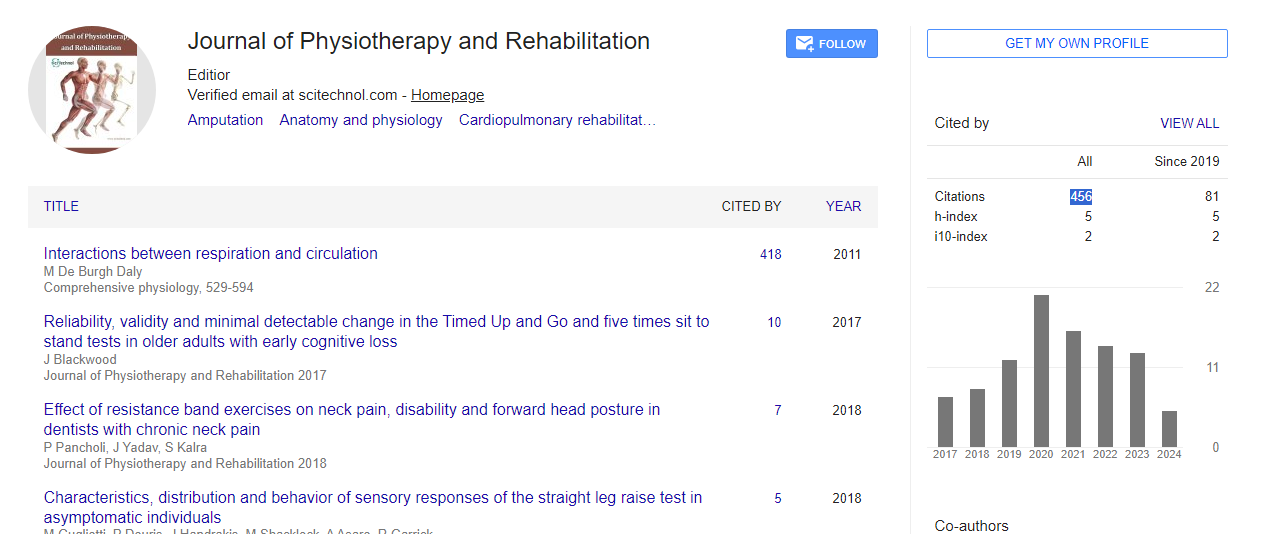Perspective, J Physiother Rehabi Vol: 7 Issue: 3
Cardiopulmonary Rehabilitation Enhancing Heart and Lung Health
Camp Zaslawski*
1Integrative Physiology and Illness Department, University of Southampton, Southampton, United Kingdom
*Corresponding Author: Camp Zaslawski,
Integrative Physiology and Illness Department, University of Southampton, Southampton, United Kingdom
E-mail: camzasla@soton.ac.uk
Received date: 22 May, 2023, Manuscript No. JPTR-23-104296;
Editor assigned date: 25 May, 2023, Pre QC. JPTR-23-104296 (PQ);
Reviewed date: 08 June, 2023, QC No. JPTR-23-104296;
Revised date: 15 June, 2023, Manuscript No. JPTR-23-104296 (R);
Published date: 22 June, 2023, DOI: 10.4172/JPTR.1000140
Citation: Zaslawski C (2023) Cardiopulmonary Rehabilitation Enhancing Heart and Lung Health. J Physiother Rehabi 7:3.
Description
Cardiopulmonary rehabilitation plays a vital role in enhancing heart and lung health for individuals with cardiac and respiratory conditions. It is a comprehensive program that combines exercise training, education and lifestyle modifications to optimize cardiovascular fitness and respiratory function.
Cardiopulmonary rehabilitation is a specialized rehabilitation program designed for individuals with cardiovascular and respiratory conditions. It aims to improve the functional capacity, reduce symptoms and enhance the overall quality of life for patients. This program provides a comprehensive strategy to enhance heart and lung health by treating both cardiac and pulmonary components.
Components of cardiopulmonary rehabilitation
Exercise training: Exercise is a key component of cardiopulmonary rehabilitation. It includes aerobic exercises, resistance training, and flexibility exercises tailored to the individual's condition and fitness level. Regular physical activity helps improve cardiovascular fitness, lung function, and overall endurance.
Education and counseling: Cardiopulmonary rehabilitation involves education and counseling sessions that provide patients with information about their condition, risk factors, medications, and lifestyle modifications. These sessions empower individuals to make informed decisions and adopt healthy habits for better heart and lung health.
Psychosocial support: Mental and emotional well-being is essential in the rehabilitation process. Psychosocial support, including counseling and support groups, helps patients cope with stress, anxiety, and depression often associated with cardiac and respiratory conditions.
Nutrition counseling: Proper nutrition plays a vital role in heart and lung health. Nutrition counseling helps patients understand dietary guidelines, make healthy food choices, and manage weight, cholesterol levels, and blood pressure.
Benefits of cardiopulmonary rehabilitation
Improved cardiovascular fitness: Regular exercise training in cardiopulmonary rehabilitation improves heart function, increases cardiac output, and enhances overall cardiovascular fitness. This leads to better endurance, reduced fatigue and improved ability to perform daily activities.
Enhanced lung function: Respiratory exercises and techniques incorporated in cardiopulmonary rehabilitation help improve lung capacity, promote efficient breathing patterns and reduce breathlessness. This results in better oxygenation of the body and improved respiratory efficiency.
Symptom management: Cardiopulmonary rehabilitation helps individuals manage symptoms associated with cardiac and respiratory conditions, such as chest pain, shortness of breath and fatigue. Through exercise, education and lifestyle modifications, patients gain strategies to better cope with and control these symptoms.
Reduced risk of complications: Participation in cardiopulmonary rehabilitation has been shown to reduce the risk of future cardiac events and respiratory complications. It helps in preventing disease progression, controlling risk factors and improving overall cardiovascular and respiratory health.
Improved quality of life: Cardiopulmonary rehabilitation enhances overall quality of life by enabling individuals to regain confidence, independence and functional abilities. It helps them resume daily activities, engage in social interactions and enjoy a more fulfilling life.
Conclusion
Cardiopulmonary rehabilitation is an essential program for individuals with cardiac and respiratory conditions, as it focuses on enhancing heart and lung health. By incorporating exercise training, education and lifestyle modifications, it provides a multidimensional approach to improve cardiovascular fitness, respiratory function and overall well-being. The comprehensive nature of cardiopulmonary rehabilitation offers numerous benefits, including improved cardiovascular and pulmonary function, symptom management, reduced risk of complications and an enhanced quality of life. Embracing cardiopulmonary rehabilitation empowers individuals to take control of their health and achieve optimal heart and lung health.
 Spanish
Spanish  Chinese
Chinese  Russian
Russian  German
German  French
French  Japanese
Japanese  Portuguese
Portuguese  Hindi
Hindi 